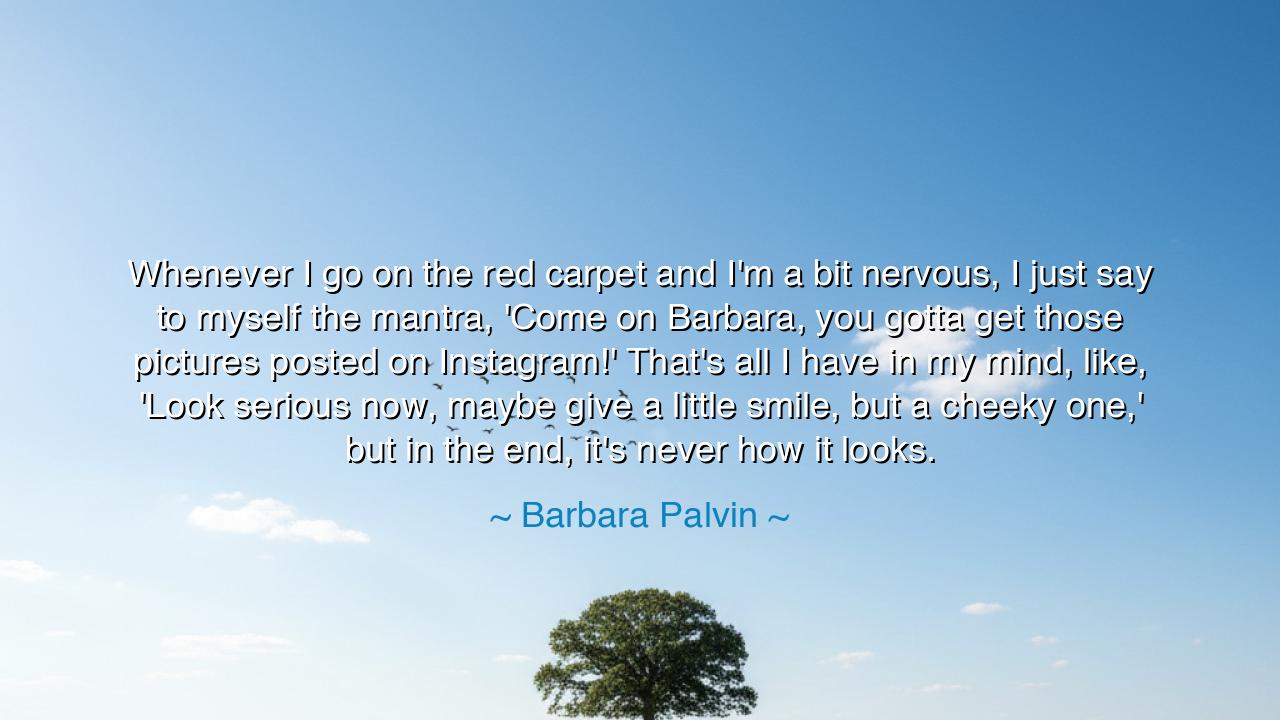
Whenever I go on the red carpet and I'm a bit nervous, I just say
Whenever I go on the red carpet and I'm a bit nervous, I just say to myself the mantra, 'Come on Barbara, you gotta get those pictures posted on Instagram!' That's all I have in my mind, like, 'Look serious now, maybe give a little smile, but a cheeky one,' but in the end, it's never how it looks.






The words of Barbara Palvin, “Whenever I go on the red carpet and I’m a bit nervous, I just say to myself the mantra, ‘Come on Barbara, you gotta get those pictures posted on Instagram!’ That’s all I have in my mind, like, ‘Look serious now, maybe give a little smile, but a cheeky one,’ but in the end, it’s never how it looks,” may seem lighthearted, yet they speak to a profound struggle of our age. In them we hear the tension between appearance and reality, between the mask worn for the crowd and the true self behind it. Her confession is at once humorous and revealing: even the most dazzling of figures on the red carpet feels the weight of nerves, the pressure of perfection, and the gap between what is imagined and what is real.
The mantra she repeats—“get those pictures posted”—is not merely about social media, but about the constant demand for presentation that defines our modern lives. Where once kings and queens adorned themselves for court, now every man and woman, in their own way, prepares themselves for the arena of appearances. The red carpet becomes a symbol of the stage upon which we all walk: the classroom, the workplace, the dinner party, the digital screen. Palvin’s honesty pulls aside the curtain, reminding us that even in the glamour of fame, the heart trembles and the mind chatters with doubt.
The ancients also wrestled with the divide between image and reality. Consider Marcus Aurelius, emperor of Rome, who wrote in his meditations about the emptiness of fame and the futility of chasing the approval of others. He cautioned that what matters is not how one appears to the crowd, but how one lives in truth before oneself and the divine. And yet, even he, emperor of the world, admitted that he too was tempted by the allure of reputation. Barbara Palvin’s confession echoes this same timeless struggle: the attempt to master appearances, while knowing deep down that “in the end, it’s never how it looks.”
There is also courage in her words. For to admit nervousness in a place where confidence is expected, to confess imperfection in a world demanding flawlessness, is itself an act of bravery. The smile, whether serious or cheeky, becomes not only a pose for the camera but a shield for the heart. Behind it stands a human being, fragile and uncertain, choosing still to face the flashing lights. In this, she reminds us that strength is not the absence of fear, but the willingness to step forward in spite of it.
Her wisdom also reveals the illusion of control. We plan our smiles, we practice our stances, we imagine how it will appear—but life always renders it differently. The picture never matches the vision. And perhaps this is the deeper truth hidden in her words: that we must learn to release control, to accept the gap between our intentions and reality, and to find peace in the imperfection of what emerges. The appearance may falter, but the authenticity of showing up remains victorious.
The lesson is clear: do not measure yourself by how you believe you appear in the eyes of others. The world’s gaze is fleeting, its judgment ever shifting. Instead, cultivate a truth within yourself—a steadiness that does not depend on the perfect smile or the flawless pose. Like Palvin, admit your nerves, laugh at your own pretense, and keep walking the red carpet of your life. In doing so, you will find freedom from the chains of constant performance.
To practice this wisdom, begin by letting go of the need for perfection in small ways. Post the photo that is not flawless. Walk into the room without rehearsing every gesture. Offer a smile that is genuine rather than calculated. In time, you will see that people are drawn not to polish but to presence, not to control but to authenticity. Let your mantra be not “look perfect,” but “be true.”
So remember, O children of tomorrow: in the end, it’s never how it looks. And that is not failure—it is liberation. For life is not a stage to be perfectly managed, but a path to be walked with honesty, humility, and courage. Smile if you will, serious or cheeky, but let it be yours, and in that authenticity you will find a beauty more radiant than any red carpet could hold.






AAdministratorAdministrator
Welcome, honored guests. Please leave a comment, we will respond soon